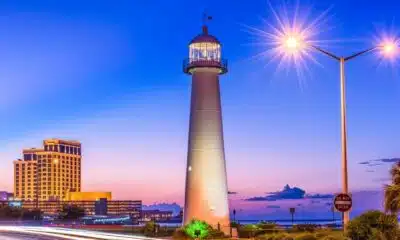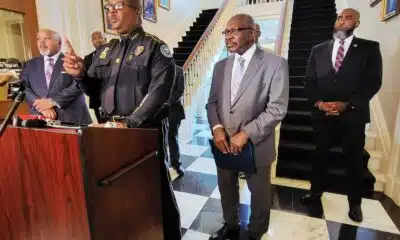Mississippi News
Sensing long-term challenges, Singing River seeks buyer
Singing River hospital is not on the brink of financial collapse. So why is it seeking a buyer?
Editor’s note: This story was reported and published in a collaboration between Mississippi Today and the Sun Herald. Isabelle Taft reported for Mississippi Today and Gautama Mehta reported for the Sun Herald.
JACKSON COUNTY – Unlike other Mississippi hospitals, Singing River Health System is not facing an immediate financial crisis – and that’s exactly why its leaders say they need to find a buyer.
The roughly 700-bed system, based in Jackson County on the Coast, came through the COVID-19 pandemic in decent shape, with revenue up in 2021. But the long-term forces buffeting Singing River and small hospitals around the country mean the future is still dark.
Costs are rising, especially for nursing staff. The hospital system needs to make improvements to facilities and equipment after years of underspending. Singing River has almost no leverage to increase payments from the state’s dominant commercial insurer, Blue Cross and Blue Shield of Mississippi. And in part because Mississippi has refused to expand Medicaid, a significant number of the system’s patients have no insurance, meaning Singing River doesn’t get paid for their care.
Hospital leaders say they need a bigger chain to take over so they can benefit from economies of scale and greater negotiating power with suppliers and insurers. If they wait until a crisis point, they’ll have less leverage and possibly fewer interested buyers.
“We’re coming at it now at a place of strength,” CEO Tiffany Murdock told a community group in the town of Hurley in August. “And in five years, I can’t promise you the same thing.”
It’s the latest demonstration of a trend with potentially troubling consequences for patients: In the world of American hospitals, only the huge survive.
From 2005 to 2017, the share of hospitals around the country that are part of a larger system rose from 53% to 66%.
In Mississippi, a 2017 merger made Baptist Memorial Health Care the largest hospital system in the state. The University of Mississippi Medical Center has expanded its footprint to Grenada, Holmes County, and the Gulf Coast and is bidding to lease hospitals in the Mississippi Delta. Rush Health Systems, which owns seven hospitals in east Mississippi and west Alabama, this year merged with Ochsner, the Louisiana-based system Singing River leaders see as their likely buyer. In 2019, Franciscan Missionaries of Our Lady, also based in Louisiana, acquired St. Dominic Memorial Hospital in Jackson.
State and locally owned hospitals like Singing River are a fading model. The American Hospital Association reports that, of the country’s 6,100 hospitals, about 950 are owned by local governments, down from 1,130 in 2008.
The potential downside of spending years trying to fight massive economic forces – and ending up in a much weaker negotiating position with a potential buyer – is clear enough in Mississippi. Hospitals like Greenwood Leflore are struggling to stay afloat long enough to find a savior or be forced to close their doors.
A growing body of research shows hospital consolidation usually increases costs for consumers by reducing competition. And despite hospital leaders’ claims about the resource benefits of joining a larger chain, research also suggests it doesn’t improve outcomes for patients.
“We know that consolidation is going to increase prices and potentially decrease access to care,” said Christopher Whaley, a health economist at RAND Corporation. “But if the alternative is that the hospital or physician group goes out of business and exits the market entirely, then maybe that’s a tradeoff we have to make.”
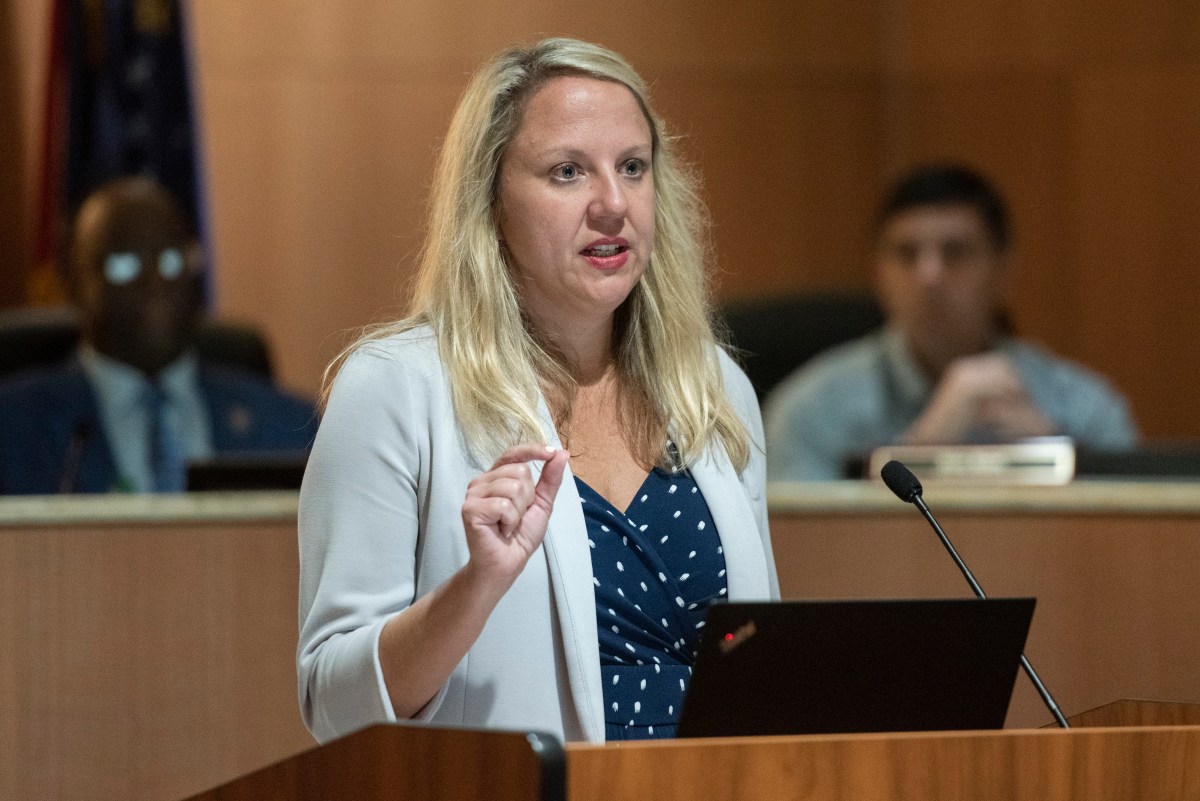
While small hospitals like Singing River look for buyers, bigger players like Ochsner – one of the biggest hospital systems in the Gulf South – have been looking for new acquisitions.
In 2020, Ochsner and Singing River announced a strategic partnership, and Singing River acquired Garden Park Medical Center in Harrison County, rebranding it as Singing River Gulfport. During Hurricane Ida, the partnership allowed Ochsner patients in hard-hit southeast Louisiana to move to the Gulfport hospital.
Corwin Harper, Ochsner CEO for Northshore and the Mississippi Gulf Coast, said expanding into Mississippi makes sense in part because so many Mississippians already use Louisiana health care facilities, and the states face similar issues with workforce recruitment.
“With Ochsner being the largest health system in Louisiana, it’s almost a natural migration for people to access the resources that Ochsner has,” he said.
Murdock, a registered nurse whose career in hospital administration has included stops in California and Oregon, was named the administrator of Singing River Gulfport. When former CEO Lee Bond stepped down earlier this year, Murdock was named interim CEO of the health system and then CEO. She is the first woman to hold the position.
In June, the hospital trustees voted to pursue a sale to a “like-minded hospital organization,” though Ochsner is generally the only name that comes up in Jackson County.
A report by the firm Raymond James found that while the hospital’s revenue had rebounded in 2021, rising expenses had cut margins. The hospital sees a high rate of uninsured patients, and federal payments to care for them are dropping. And as a small system, it has little opportunity to access loans or to increase cash flow by negotiating with insurers, since most of its patients are on Medicaid or Medicare and the commercial market is dominated by Blue Cross.
“It’s a nationwide issue,” Ryan Kelly, executive director of the Mississippi Rural Health Association, said of hospitals’ financial struggles. “But it is especially important here because we are a more poor state. Our hospitals are in the red, like on the verge of closure in a critical state, and it’s not because our hospitals are doing anything wrong or there’s anything wrong with Mississippi. It’s just because we’re a poor state and we have less money to go around.”
The pandemic also highlighted the benefits of scale.
“We were spending, you know, a nickel on a surgical mask five years ago when during the height of COVID, we’re spending $5 a mask and buying thousands of masks,” Murdock said at the community meeting in Hurley.
Ochsner, by contrast, built its own plant to make personal protective equipment in Lafayette.
But scale can come with a loss of local autonomy.
Ochsner also has a lease agreement with Hancock Medical Center on the Coast. In May, Ochsner closed the labor and delivery unit at the hospital, citing the low number of deliveries that made it hard to operate the unit safely. That left the county without a single labor and delivery unit and frustrated some Hancock County residents and leaders.
Over the summer, a Singing River retiree named Irby Tillman appeared poised to derail hospital executives’ plans.
Under Mississippi law, anyone can force a referendum on a public hospital sale by obtaining a petition with at least 1,500 signatures. Tillman, who worked as a carpenter at the hospital, was at one of the board of supervisors meetings where the sale was discussed. He heard an attorney say that the supervisors would make the decision – unless someone forced a referendum.
“I happened to be standing there and I said, ‘Well, I’ll take that challenge,’” he said. “I don’t think five men should have that big decision.”
But even if Tillman had never launched his petition drive, pursuing the sale would have required Singing River executives to embark on a kind of political campaign to persuade not only supervisors but also their constituents to support the sale.
The hospital is the second-largest employer in Jackson County with more than 3,500 employees. People all over the county remember births and deaths, emergencies and routine check-ups, first jobs and decades-long careers at Singing River.
Many of them also remember a profound betrayal: For years, the hospital secretly stopped paying into retirees’ pension fund before it collapsed in 2014. A settlement in a federal class-action lawsuit resulted in lower payments than retirees had been promised.
Murdock embarked on a county-wide speaking tour late this summer. She spoke at school district convocations and rotary club meetings, the chamber of commerce and churches, trying to convince people to support the sale.
At a special meeting for pensioners, Murdock assured them the sale would not affect the pension settlement.
Meanwhile, Tillman traveled the county, too. In late August, he and his cousin Paul Wise, also 73 and a Singing River retiree, spent several hours outside Ixtapa, a Mexican restaurant in Vancleave. They both grew up in Pascagoula, two of their grandmother’s 75 grandchildren. Wise was leaning toward supporting the sale, while Tillman was leaning against it.
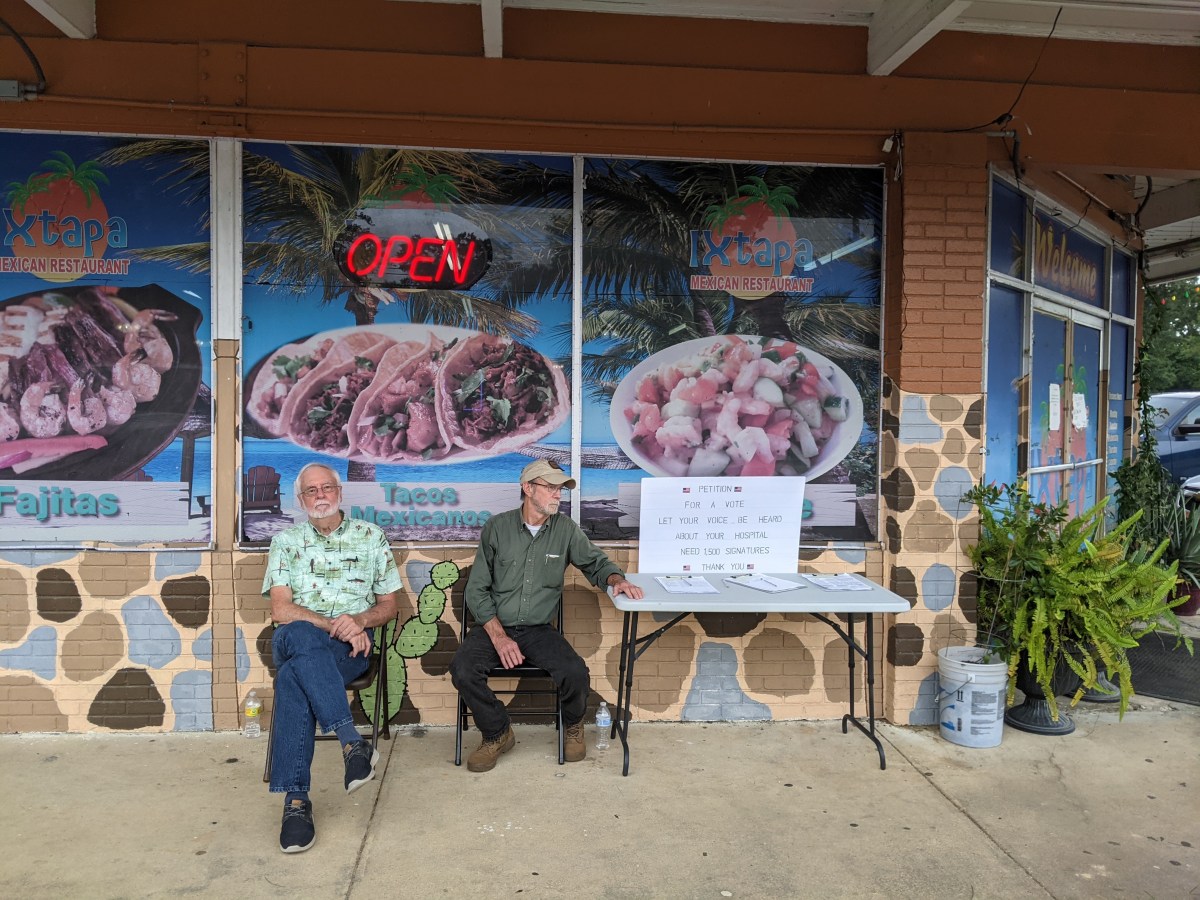
Tillman prided himself on never saying a word about how he thought anyone should vote, only emphasizing the importance of having a say in the process. The men carried a handmade poster that said “Let your voice be heard” and was decorated with small American flags. Everyone they talked to wanted to see a referendum.
All five supervisors and even Murdock signed the petition.
“If I didn’t sign, I didn’t want (that) to get in the way of the goal, which is to move this forward,” she said. “And so I didn’t want that to be the headline. I wanted the headline to be like, ‘This is the right thing to do, whether there’s a petition or not.’”
But she was wary of what a referendum could mean.
Mississippi Today could locate only one such referendum in state history. Oktibbeha County voters roundly rejected a proposal to sell OCH Regional Medical Center in 2017. If that happened in Jackson County, Singing River leaders said the county would have to raise taxes and still be unable to cover rising costs.
In the end, Tillman did not gather enough signatures to require a referendum. It rained heavily in the weeks before the deadline to turn in the petition, and Tillman relied on old fashioned methods to obtain signatures.
“Water and ink don’t go together too good,” he said.
And after months of discussion, showing up to board of supervisors meetings and public hearings, he was leaning toward supporting the sale anyway, he said.
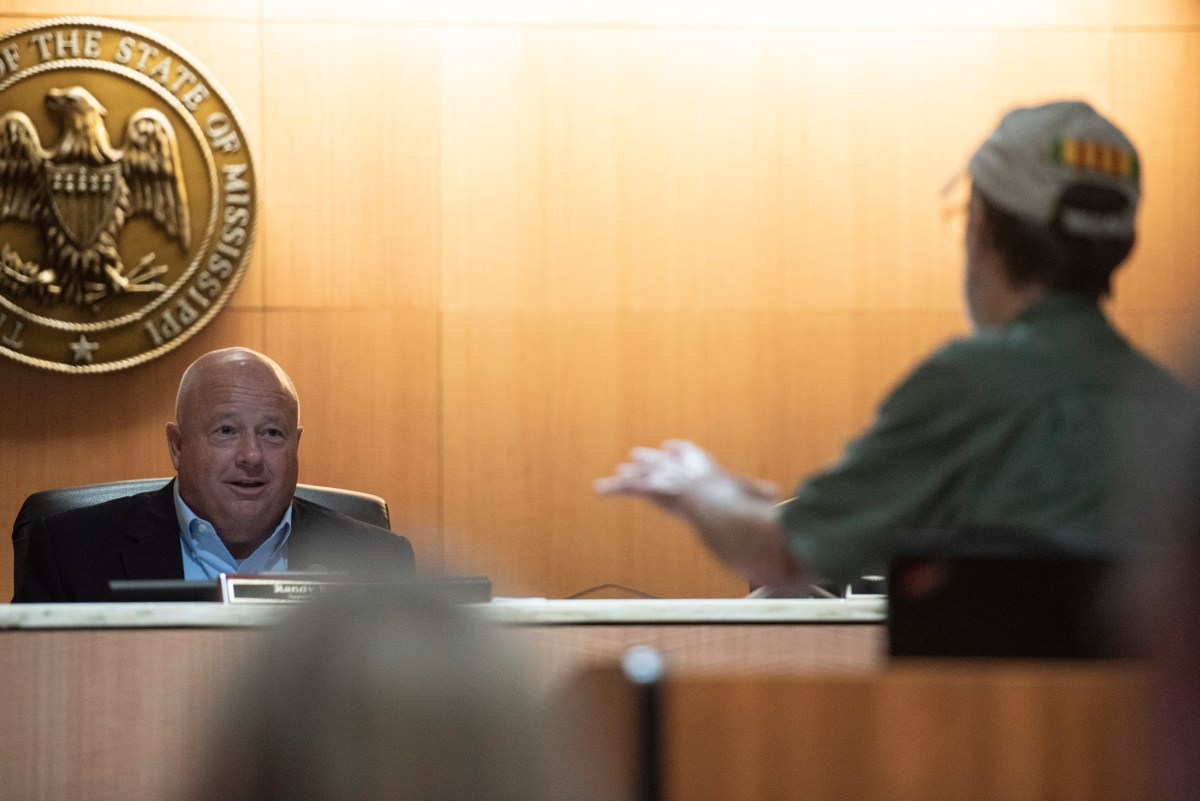
The Jackson County Board of Supervisors doesn’t yet have a specific timeline for when the request for proposals will be finalized and buyers can begin submitting bids.
The potential buyer frequently mentioned by name in Jackson County is Ochsner. But other hospital chains could make a move, too.
The Franciscan Missionaries of Our Lady Health System (FMOLHS), which operates St. Dominic Memorial Hospital in Jackson and hospitals in Louisiana, said in a statement that it is “aware” that an RFP has been issued.
“FMOLHS regularly evaluates opportunities to expand access to care by partnering with quality health systems to bring together outstanding clinicians, the most advanced technology and leading research to ensure that our patients receive the highest quality and safest care possible,” said Kevin Cook, chief operating officer.
The sale will leave Mississippi with one less locally owned hospital, and it may be an indication of the future facing every small hospital in the state.
Richard Roberson, general counsel and vice president of policy at the Mississippi Hospital Association, said Singing River’s situation highlights the structural forces working against Mississippi hospitals.
“I think that is what’s scary about it – you do see a hospital that is a strong hospital, a strong health system, and as good as they do things, they’re still struggling,” Roberson said.
This article first appeared on Mississippi Today and is republished here under a Creative Commons license.
Mississippi News
Girls, parents and gym owner reported concerns about gymnastics coach years before sex abuse case
SUMMARY: Sean Gardner, a gymnastics coach, faced multiple abuse allegations from gymnasts and parents dating back to 2018, yet he continued coaching and was even promoted at Chow’s Gymnastics, owned by renowned coach Liang “Chow” Qiao. Despite reports of inappropriate touching and grooming behavior, USA Gymnastics and SafeSport failed to act decisively. Gardner was banned in 2022 after a sexual abuse complaint but was arrested only in 2025 following FBI investigation revealing he installed hidden cameras to exploit young gymnasts. The case highlights systemic failures by gymnastics authorities, law enforcement, and the gym in protecting athletes from abuse.
Read the full article
The post Girls, parents and gym owner reported concerns about gymnastics coach years before sex abuse case appeared first on www.wjtv.com
Mississippi News
Leaders, family mark 70th anniversary of Emmett Till’s murder
SUMMARY: In honor of Emmett Till and the 70th anniversary of his 1955 lynching in Mississippi, leaders and family will hold a news conference at the Mississippi State Capitol on August 28, 2025. Till, a 14-year-old Black Chicago teen, was brutally murdered after being falsely accused of whistling at a white woman. His killers were acquitted by an all-white jury but later confessed. His death galvanized the Civil Rights Movement. Recently, thousands of previously unreleased federal records detailing the investigation were made public. President Biden signed legislation making lynching a federal hate crime and established a national monument honoring Till and his mother.
Read the full article
The post Leaders, family mark 70th anniversary of Emmett Till's murder appeared first on www.wjtv.com
Mississippi News
Kilmar Abrego Garcia surrenders to ICE in Baltimore, again faces possible deportation
SUMMARY: Kilmar Abrego Garcia, a Salvadoran national detained by U.S. immigration authorities in Baltimore, faces potential immediate deportation under the Trump administration. A Maryland federal court order pauses deportations for immigrants challenging detention, including Abrego Garcia. Previously wrongfully deported to El Salvador despite fearing violence, he was returned to the U.S. and charged with human smuggling, which he denies, calling the prosecution vindictive. The administration alleges gang ties, which he rejects. Abrego Garcia faces deportation to Uganda, a new U.S. deportation partner, despite his family and life in Maryland. His attorneys seek to block deportation pending legal review and due process.
The post Kilmar Abrego Garcia surrenders to ICE in Baltimore, again faces possible deportation appeared first on www.wjtv.com
-
Mississippi Today4 days ago
DEI, campus culture wars spark early battle between likely GOP rivals for governor in Mississippi
-
News from the South - Louisiana News Feed7 days ago
K+20: Katrina alters local health care landscape, though underlying ills still the same
-
News from the South - North Carolina News Feed6 days ago
Parasocial party: Why people are excited for the Taylor Swift, Travis Kelce engagement
-
Local News6 days ago
Police say Minneapolis church shooter was filled with hatred and admired mass killers
-
Local News Video5 days ago
08/29 Ryan's “Wet End to the Week” Friday Forecast
-
News from the South - Kentucky News Feed6 days ago
Lexington Man Convicted of Firearms Offenses
-
The Conversation7 days ago
Pregnant women face tough choices about medication use due to lack of safety data − here’s why medical research cuts will make it worse
-
News from the South - Arkansas News Feed7 days ago
Catholic community in Fayetteville prays for Minneapolis victims, reflects on safety








